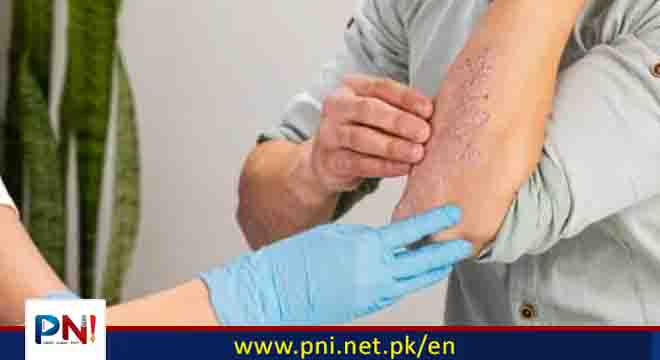ISLAMABAD, Sep 10 (ONLINE): New research is shedding light on how an infection with COVID-19 may reactivate, or even cause, psoriasis.
The skin condition affects about 7.5 million adults in the United States, according to the National Psoriasis Foundation. Psoriasis has several well-established triggers, including stress, skin injury, cold or warm air, and allergies. Illnesses like strep throat can also cause a psoriasis flare in some people – and it appears COVID may also do so.
“Psoriasis flares have long been associated with bacterial and viral infections, particularly a form of psoriasis called guttate, which is characterized by tons of tiny red scaly bumps all over the body,” said Joel M. Gelfand, MD, a professor of dermatology and epidemiology at the University of Pennsylvania’s Perelman School of Medicine in Philadelphia.
“Infection with COVID-19 has been associated with flares of guttate and pustular psoriasis, and even psoriasis that affects 100% of the skin, which is called erythroderma, in many published case reports.”
What Makes Your Psoriasis Severe?
What Makes Your Psoriasis Severe?
Your immune system is actually to blame for those itchy, sore patches of skin. It’s considered severe when it covers what percentage of your body?
.A study from Albany Medical College/Weirton Medical Center found that people in the study who were already diagnosed with the skin condition had an unexpected flare within a week to a month after testing positive for COVID. New psoriasis after a COVID infection was also found. The researchers think this could be because COVID causes inflammation in the body, which negatively affects previously well-controlled psoriasis. They also think it’s possible that COVID-related inflammation could trigger a genetic tendency to have psoriasis, which may explain why it can appear for the first time after a positive test.
Inflammation in the body commonly manifests itself through skin conditions.
“The skin is the largest organ in the body,” said Robert O. Carpenter, MD, director of wellness at Texas A&M College of Medicine in Bryan, TX. “A viral infection like COVID-19 can signal the release of pro-inflammatory factors that can appear as rashes, such as with psoriasis.”
What are the Symptoms of COVID-Related Psoriasis?
The signs are the same as those of any form of psoriasis. According to the Mayo Clinic, these signs can include:
• A patchy, scaly, raised red rash. Psoriasis can also be purple, pink, gray, brown or silver. The rash can appear anywhere on the body. Psoriasis can also look like dandruff.
• Dry, cracking skin that sometimes peels
• Itching, burning, or painful skin
How to Treat Cracked and Bleeding Psoriasis How to Treat Cracked and Bleeding Psoriasis Patches
Step-by-step instructions on how to care for cracked, bleeding skin, from cleaning to covering the cut.
If I Have Psoriasis, Will COVID Automatically Make It Worse?
Not necessarily.
“Psoriasis is a common condition, so people should be aware that new psoriasis that develops may not be related to COVID-19,” said Esther Freeman MD, PhD, director of global health dermatology at Massachusetts General Hospital in Boston.
As with every aspect of COVID, doctors and scientists are still learning about how serious and widespread a problem psoriasis after COVID-19 may be. “We have seen case reports that psoriasis can flare after COVID-19,” said Freeman, who is also an associate professor of dermatology at Harvard Medical School. “I will say, this has not been a tidal wave – more like sporadic cases here and there. So I do not think psoriasis flares are a major post-COVID finding, nor do they necessarily mean you have long COVID. That being said, we know that many different infections can cause psoriasis flares, and so in that respect, it’s not that surprising that SARS-CoV-2, like other infections, could trigger a psoriasis flare.”
Could getting COVID more than once cause psoriasis to flare? It’s possible.
“Your body can change after having COVID-19,” said Carpenter. “We don’t know the long-term implications, but having COVID-19 repeatedly can increase the risk of long COVID, which can cause many systemic changes in your body.”
Another important point: If you take biologics, the immune-modulating therapy to treat psoriasis, getting vaccinated and boosted for COVID is an important step to take to help protect yourself.
Is Psoriasis Itself a Potential Symptom of COVID?
“Yes, but we don’t know the frequency at which this may occur, and a causal relationship is difficult to establish from just case reports,” said Gelfand, who’s also medical director of the Clinical Studies Unit in the Department of Dermatology at his university. “Typically, if a patient presents with a flare of psoriasis, particularly guttate, pustular, or erythrodermic forms, an infectious trigger should be considered, and testing for strep and possibly COVID-19 may be appropriate.”
If you do have a flare of psoriasis, or get one for the first time after testing positive for COVID, you should also ask your dermatologist about new treatment options.
Follow the PNI Facebook page for the latest news and updates.









